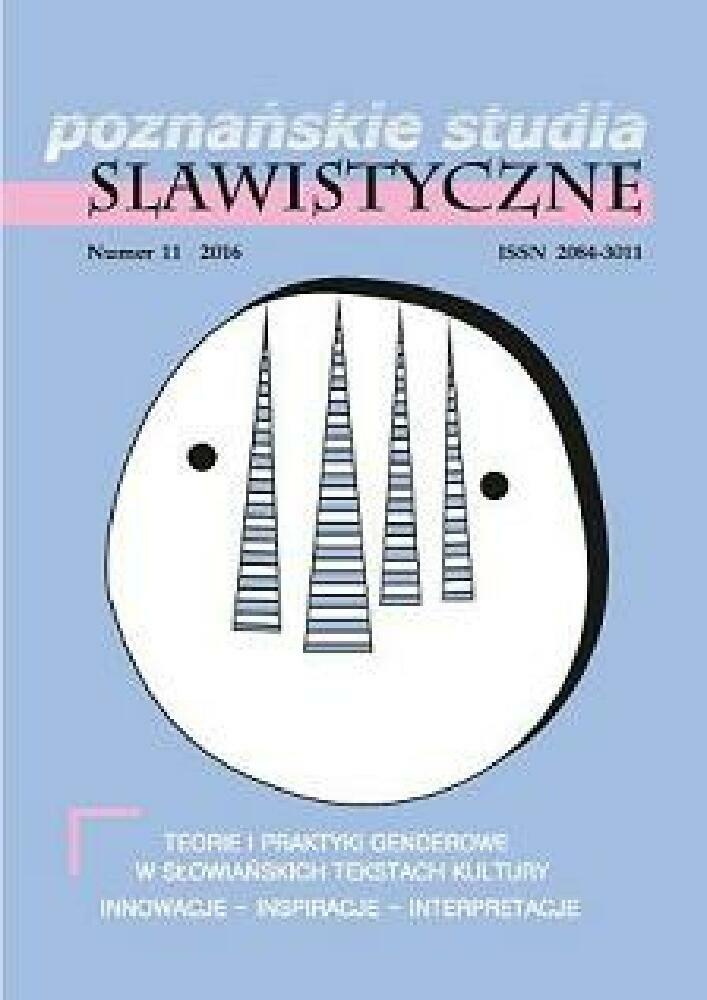Abstract
Slovenian authors who contribute to the feminist and later lesbian discourse are often also the poets and writers. As far as the feminist and lesbian theory tradition is concerned, the connection to western theories is present. Slovenian women writers and their female characters think about the options of a female subject position, they reflect their own dilemmas and issues in the creative process. While the character of a heterosexual feminist is still marginal in modern Slovenian literature, the character of a lesbian realizing the demands of radical feminism has become a self-evident part of the Slovenian literary production with the works of Suzana Tratnik and Nataša Sukič.References
Antić M.G., Vidmar K.H., 2006, The construction of woman’s identity in socialism: the case of Slovenia, in: Gender and identity: theories from and/or on Southeastern Europe, eds. J. Balgojević, K. Kolozova, S. Slapšak, Belgrade, pp. 219–237.
Bogataj M., 1997, Pod ničlo, Ljubljana.
Bojetu B., 1900, Filio ni doma, Celovec.
Bojetu B., 1994, „Želim si, da bi bilo v meni še veliko žensk”: pogovor s pesnico in pisateljico, “Delo” no. 51, p. 13.
Bojetu B., 1995, Ptičja hiša, Celovec. Borovnik S., 1995, Pišejo ženske drugače?, Ljubljana. Borovnik S., 2007, Razbijanje stereotipov v prozi Suzane Tratnik, in: Stereotipi v slovenskem jeziku, literaturi in kulturi, ed. J. Novak-Popov, Ljubljana, pp. 78–85.
Borovnik S., 2009, Novosti v prozi sodobnih slovenskih pisateljic, in: Treći hrvatskoslovenski skup. Tretje hrvaško-slovensko slavistično srečanje, ed. A. Peti-Stantić, Zagreb, pp. 179–192.
Borovnik S., 2013, Značilnosti krajše proze slovenskih književnic, “Slavia Centralis” no. 1, pp. 59–69.
Celestin F., 1884, Žensko vprašanje, “Ljubljanski zvon” no. 2; no. 3, pp. 89–92, 161– –165.
Hriberšek Z., 2008, Vozi me vlak v daljave, daleč, “Apokalipsa” no. 121/122, pp. 368– –371.
Jalušič V., 2002, Kako smo hodile v feministično gimnazijo, Ljubljana.
Jeraj M., 2006, Tomšič Vida (1913–1998), in: A Biographical Dictionary of Wo men’s Movements and Feminisms. Central, Eastern, and South Eastern Europe, 19th and 20th Centuries, eds. F. de Haan, K. Daskalova, A. Loutfi, Budapest–New York, pp. 575–579.
Klavžar K., 2006, Vode Angela (1892–1985), in: A Biographical Dictionary of Wo men’s Movements and Feminisms. Central, Eastern, and South Eastern Europe, 19th and 20th Centuries, eds. F. de Haan, K. Daskalova, A. Loutfi, Budapest–New York, pp. 604–605.
Kozin T., 2010, Že tako dolgo se pogrešam, “Delo” no. 27, p. 17.
Kveder Z., 2005, Zbrano delo Zofke Kveder, Ljubljana.
Orožen B., 1983, Starši in otroci v spisih Zofke Kveder, “Jezik in slovstvo” no. 7–8, pp. 3–6.
Plesničar V., 2012, Odmik od literarnosti v opusu Nataše Sukič, Nova Gorica.
Sukič, N., 1998, Kiberfeminizem, “Zofa: časopis za zaprte kroge”, no. 9, pp. 50–51.
Sukič, N., 2005, Desperadosi in nomadi, Ljubljana.
Sukič, N., 2007, Pisava je nekaj telesnega, ženske morajo pisati o svoji seksualnosti, o svoji erotizaciji, “Delo”, no. 89, p. 19.
Sukič, N., 2007a, Queer telesa v elektronskih medijih, “Časopis za kritiko znanosti, domišljijo in novo antropologijo”, no. 229–230, pp. 51–61.
Tratnik, S., 1995, Queer: teorija in politika spolnega izobčenstva, “Časopis za kritiko znanosti, domišljijo in novo antropologijo” no. 177, pp. 63–74.
Tratnik S., 1997, Pod ničlo, Ljubljana. Tratnik S., 2001, Ime mi je Damjan, Ljubljana.
Tratnik S., 2003, O literaturi, lezbištvu in aktivizmu, “Primorska srečanja” no. 271– –272, pp. 60–68.
Tratnik S., 2004, Lezbična zgodba – literarna konstrukcija seksualnosti, Ljubljana.
Tratnik S., 2004, Zanimajo me ponesrečene zgodbe, “Mentor: mesečnik za vprašanja literature in mentorstva” no. 3, pp. 44–51.
Tratnik S., 2007, Tretji svet, Ljubljana. Tratnik S., 2012, Rezervat, Ljubljana.
Tratnik S., 2013, Lezbični aktivizem po korakih, Ljubljana.
Velikonja N., Greif T., 2012, LL25/Lezbična sekcija LL: kronologija 1987–2012 s predzgodovino, Ljubljana.
Zupan Sosič A., 2005, Spolna identiteta in sodobni slovenski roman, “Primerjalna književnost” no. 2, pp. 93–113.
License
Copyright (c) 2016 Katja Mihurko Poniž

This work is licensed under a Creative Commons Attribution-NoDerivatives 4.0 International License.
